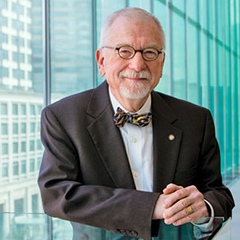A few key things bind us all as humans: birth and death are two. In between there are also adolescent rites of passage, marriage, and aging.
For many, these momentous events are marked through religious rituals. Birth can be celebrated with a baptism or a bris. An Indian marriage ceremony is as solemn and beautiful as one held in Spain. And a funeral in New Orleans is as celebratory as an Irish wake.

Sacred, a new feature-length film, explores these religious rituals around the globe from birth to death. It is a rare documentary in that there are no narrators. The lives of the subjects tell the story alone.
The film will premiere at DocNYC Film Festival on Nov. 12, and Nov. 14 at IFC Center. It will have additional premieres at festivals in Amsterdam and Tokyo in the next month.
“It’s a beautiful film and truly profound,” said the film’s producer William Baker, Ph.D., Fordham’s Claudio Acquaviva Chair and director of the Bernard L. Schwartz Center for Media, Public Policy, and Education at the Graduate School of Education.
Baker said that the center was intricately involved in making the film for New York’s Public Broadcasting Station (WNET/THIRTEEN). The center also commissioned Juilliard composer Edward Bilous to write and score the music and recommended Academy Award winner Thomas Lennon as director. Patrick Ryan, S.J., Fordham’s Laurence J. McGinley Professor of Religion and Society, served as a consultant on the film.
“We want to show how people of all faiths use their beliefs to go through life—from birth through our death,” Baker said. “There are great similarities; in a sense we’re all doing the same things.”
Lennon’s process in making the film was as diverse as its subject matter, Baker said. Lennon sourced contributions from more than 40 filmmakers and asked them to record intimate scenes from more than 25 countries. The storyline follows life’s journey from birth to death in a linear fashion, but it diverges to explore the many ways that people around the globe experience faith.
With a $3 million budget, the film was a costly project for public television, said Baker. It was largely possible because of a $1 million gift from WNET board member George O’Neal and close friend and supporter Janet Carrus.
With seven Emmy awards behind him, Baker said he knew he had to create “something special.” The film will make the festival circuit and will likely be shown in art house cinemas before being aired on PBS next year. Baker is also hoping the film can be shown on campus as well.
While Baker said the project was “gestating” for about six years, it took only two years to complete. He said the process has confirmed his belief that faith—no matter the religion—is critical to human survival.
“We know now that religion has been blamed for a lot of the problems that exist in the world, but it should be praised for helping people get though life,” he said.
